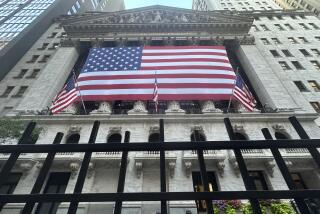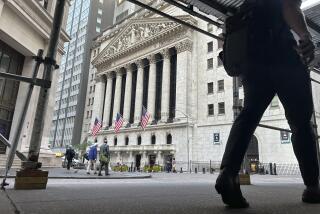Blue Chips Up, Tech Stocks Down in Lackluster Session
Blue-chip stocks rose for the first time in a week Monday as crude-oil prices tumbled, indicating that consumer spending may pick up. Wal-Mart Stores led the gain.
“Energy prices are equivalent to a tax,” said Ray Rund, managing director at Shaker Investments Inc. in Cleveland. “If prices come down, that frees up money for other forms of consumption.”
The market couldn’t quite shake off last week’s four-session losing streak, which was based on worries about higher oil prices and inflation. Monday’s trading was lackluster due to a dearth of major earnings or economic news and the fact that many traders were absent ahead of New Year’s.
The Dow Jones industrial average closed up 29.07 points, or 0.4%, at 8,332.85, having lost 2.4% last week. The tech-laden Nasdaq composite index fell 8.77 points, or 0.7%, to 1,339.54 and the Standard & Poor’s 500 index advanced 3.99 points, or 0.5%, to 879.39.
Winners outnumbered losers by 5 to 4 on the New York Stock Exchange while losers led by 3 to 2 on Nasdaq.
The market has forfeited the so-called Santa Claus rally, which typically begins just before Christmas and runs through the end of the year.
Historically, the last two weeks of the year are robust for Wall Street as investors grow optimistic about the next 12 months. This year, though, the Dow and the S&P; 500 are headed for their worst December performance since 1931.
Rising oil prices have reminded investors that inflation could pose another threat to the uncertain economic recovery. Increasing tension in Iraq and an oil strike in Venezuela already have sent crude prices surging.
“Once again, the scenario is earnings, the economy and external risks.... Investors are sitting on the fence,” said Alan Ackerman, executive vice president of Fahnestock & Co.
Oil prices, up 30% since mid-November, retreated Monday as the OPEC cartel indicated its readiness to fill supply gaps caused by a 29-day oil strike in Venezuela and looming war in Iraq.
Crude futures fell $1.35 to $31.37 a barrel in New York trading after earlier rising to a two-year high of $33.65.
In other highlights:
* Wal-Mart rose $1.48 to $50.64 after saying sales were strong during Christmas week but that it still expects only a modest increase for the season.
* J.C. Penney also ended higher, up 82 cents at $22.89. On Monday, the department store operator reported better-than-expected holiday sales, due to aggressive advertising that lured in more shoppers in the days before Christmas. The S&P; retailing index ended up 2.4%.
* Banks rose on the prospect of higher consumer credit card spending. Wells Fargo, the fifth-biggest U.S. bank, rose 78 cents to $47.08; PNC Financial Services Group gained 93 cents to $41.96; and MBNA climbed 44 cents to $19.11.
* Chip stocks fell on worries about the outlook for the industry. The SOX index of semiconductor stocks fell 2.2%, led lower by Intel, which fell 64 cents to $15.76. Semiconductor equipment maker Applied Materials fell 23 cents to $13.29.
* Exxon Mobil advanced 11 cents to $34.75. ChevronTexaco rose 75 cents to $66.65. Amerada Hess rose 47 cents to $55.13. The recent surge in prices bodes well for oil companies, but higher energy prices could cut profits for consumers and the rest of corporate America.
* Gold fell back from six-year highs as year-end profit-taking kicked in. In New York trading, February gold fell $5.80 to $343.40 an ounce. But even with Monday’s retreat, gold is up about 23% after a year of world political turmoil, war risks and weak stock markets.
More to Read
Inside the business of entertainment
The Wide Shot brings you news, analysis and insights on everything from streaming wars to production — and what it all means for the future.
You may occasionally receive promotional content from the Los Angeles Times.










